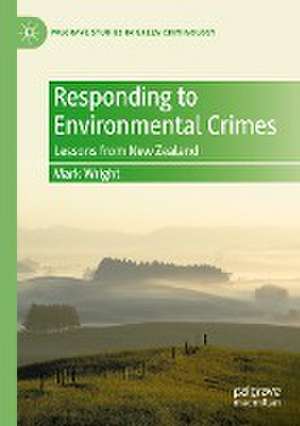Responding to Environmental Crimes: Lessons from New Zealand: Palgrave Studies in Green Criminology
Autor Mark Wrighten Limba Engleză Paperback – 11 noi 2022
| Toate formatele și edițiile | Preț | Express |
|---|---|---|
| Paperback (1) | 724.00 lei 6-8 săpt. | |
| Springer International Publishing – 11 noi 2022 | 724.00 lei 6-8 săpt. | |
| Hardback (1) | 729.23 lei 6-8 săpt. | |
| Springer International Publishing – 10 noi 2021 | 729.23 lei 6-8 săpt. |
Din seria Palgrave Studies in Green Criminology
-
 Preț: 319.35 lei
Preț: 319.35 lei -
 Preț: 386.22 lei
Preț: 386.22 lei - 15%
 Preț: 642.18 lei
Preț: 642.18 lei - 18%
 Preț: 782.42 lei
Preț: 782.42 lei - 18%
 Preț: 891.48 lei
Preț: 891.48 lei - 18%
 Preț: 948.79 lei
Preț: 948.79 lei -
 Preț: 451.26 lei
Preț: 451.26 lei - 15%
 Preț: 645.96 lei
Preț: 645.96 lei - 15%
 Preț: 648.24 lei
Preț: 648.24 lei - 18%
 Preț: 894.79 lei
Preț: 894.79 lei - 18%
 Preț: 944.82 lei
Preț: 944.82 lei - 15%
 Preț: 577.72 lei
Preț: 577.72 lei - 15%
 Preț: 637.13 lei
Preț: 637.13 lei - 18%
 Preț: 888.49 lei
Preț: 888.49 lei - 18%
 Preț: 895.45 lei
Preț: 895.45 lei - 18%
 Preț: 949.73 lei
Preț: 949.73 lei - 15%
 Preț: 696.82 lei
Preț: 696.82 lei -
 Preț: 382.75 lei
Preț: 382.75 lei - 18%
 Preț: 945.14 lei
Preț: 945.14 lei
Preț: 724.00 lei
Preț vechi: 882.92 lei
-18% Nou
Puncte Express: 1086
Preț estimativ în valută:
138.56€ • 144.12$ • 114.38£
138.56€ • 144.12$ • 114.38£
Carte tipărită la comandă
Livrare economică 15-29 aprilie
Preluare comenzi: 021 569.72.76
Specificații
ISBN-13: 9783030892524
ISBN-10: 3030892522
Pagini: 240
Ilustrații: XIII, 240 p. 3 illus., 2 illus. in color.
Dimensiuni: 148 x 210 mm
Greutate: 0.34 kg
Ediția:1st ed. 2022
Editura: Springer International Publishing
Colecția Palgrave Macmillan
Seria Palgrave Studies in Green Criminology
Locul publicării:Cham, Switzerland
ISBN-10: 3030892522
Pagini: 240
Ilustrații: XIII, 240 p. 3 illus., 2 illus. in color.
Dimensiuni: 148 x 210 mm
Greutate: 0.34 kg
Ediția:1st ed. 2022
Editura: Springer International Publishing
Colecția Palgrave Macmillan
Seria Palgrave Studies in Green Criminology
Locul publicării:Cham, Switzerland
Cuprins
1. Introduction: Are the Offences in the Resource Management Act 1991 (RMA)Working?.- 2. The Context for the Enquiry: Regulation and the RMA.- 3. Theoretical Framework: Compliance, Enforcement, Sanctions and the Criminal Law.- 4. Failing the First Test: The Offences are not Effective.- 5. Explaining the Lack of Effectiveness: Constraints and Choices.- 6. Failing the Second Test: The Offences are being used Inappropriately.- 7. Explaining the Inappropriate Use: Form versus Substance.- 8. The Offences are not Working: Implications for Green Criminology.
Notă biografică
Mark Wright is Lecturer in the School of Law at the University of Canterbury, New Zealand. Before then he worked on regulatory prosecutions, in particular prosecutions under New Zealand's Resource Management Act 1991.
Textul de pe ultima copertă
This book provides a critical study of environmental regulation and its enforcement in New Zealand, situated within green criminology. It seeks to address the question of whether the offences in the Resource Management Act 1991 are 'working', by drawing on a range of sources including: central government data, local government policies and reports on enforcement, information requests of councils, studies of local authority enforcement behaviour and case law to. Through highly layered and richly textured analysis, the project exposes the problems that can arise when an expansive approach is taken to offences, penalties and institutional arrangements in an environmental regulatory statute. It emphasizes how discussions of harm and what should be unlawful will ensure that law-makers' enforcement tools will align with their goals for punishment. It examines higher-level issues such as ‘wrongfulness’ and ‘criminality’ in the environmental regulatory context and explores the relevance of itsfindings to jurisdictions outside of New Zealand. It also discusses the pros and cons of criminalisation and punishment versus restoration. It speaks to those interested in green criminology, regulatory compliance and enforcement, and applications of criminal law.
Mark Wright is Lecturer in the School of Law at the University of Canterbury, New Zealand. Before then he worked on regulatory prosecutions, in particular prosecutions under New Zealand's Resource Management Act 1991.
Caracteristici
Challenges the image of New Zealand as being “clean, green” and at the forefront of environmental legislation Contains some practical advice for legislators and regulatory authorities Discusses the relevance of its findings to jurisdictions outside of New Zealand
